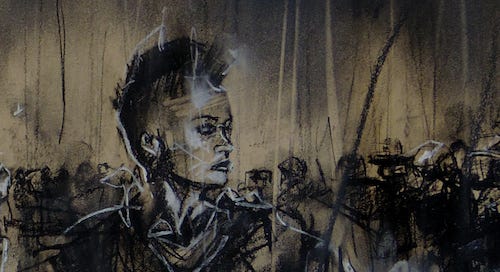Smashing literature
Smash the System: Punk Anarchism as a Culture of Resistance, Eds Jim Donaghey, Will Boisseau and Caroline Kaltefleiter, reviewed by Gavin O'Toole, 19 February 2023
Smash the System: Punk Anarchism as a Culture of Resistance, Edited by Jim Donaghey, Will Boisseau and Caroline Kaltefleiter, 2022, Active Distribution
There’s an energy crisis and its prolonging the suffering of workers.
No, I’m not talking about gas and electricity—although none of us can pay our bills and I’m freezing as I write this.
I’m talking about the Left. There’s an energy crisis on the Left. They’re run out of energy and can no longer fire the revolutionary boiler. As a result, workers are being kept in the cold.
The Left needs a new source of power: abundant, renewable, non-toxic. They need punk.
CrimethInc. tells us why in its brilliant Foreword to Smash the System, a collection of essays documenting and explaining the critically important role anarchist punk plays as a culture of resistance.
This long overdue book offers an original snapshot of the laser focus—and wild, empowering energy—punk as a culture has brought to anarchist activism on the ground in daily struggles.
And by providing a cultural aesthetic, a voice with which to speak to groups marginalised by the factional fetishism of bureaucratised political action, punk has revitalised anarchism, injecting a new source of energy. It is, as CrimethInc. points out, the ideal cultural vehicle.
This is something the jaded Left slumped in an armchair imaging its “anodyne utopia” should consider—an arena in which to create a “dangerous utopia” in real life dedicated to a concrete aim that should be the ambition of any revolutionary: not to reform the system, but to smash it.
Editors Jim Donaghey, Will Boisseau and Caroline Kaltefleiter have put together an essential collection of essays that explore the activist and political/cultural overlaps of anarchism and punk, pointing out that for years this has been under-appreciated, taken for granted, or met with misunderstanding and hostility.
This is by no means a straightforward relationship—it is diverse and complex, drawing on different traditions in different countries. What is without doubt, however, is that it is a relationship that generates its own, new source of energy from the chemical reaction of two great counter-cultural movements.
As UK punk activist Jay Kerr, founding member of Punk Ethics, writes, upon closer inspection this synergy can be identified in history: “The threads that make up the patchwork of punk seem to have an anarchist ethics woven in, while the fabric itself seems to be sewn from a thread whose strand can be traced back through the history of the anarchist movement.”
While the book takes a global perspective, Latin America is at the beating heart of this phenomenon, providing many examples of punk activism that draw on anarchist roots.
The chapter “Kubazuela” by Rodolfo Montes de Oca considers the historical ties between punk anarchists in Cuba and Venezuela and the dilemmas they face resisting oppression under bureaucratic state socialism while resisting the suffocating maw of US imperialism.
In Brazil, Antônio Carlos de Oliveira explains how his work compiling an archive on the punk movement benefited from the intergenerational links formed between younger punks and older anarchists in São Paulo. In Brazil, anarchism clearly has different meanings, not only for acolytes but for diverse punk scenes, as explored by João Bittencourt and Tiago Viera, who compare the ideas of anarchist punks in different parts of this vast country.
Mariana Gabriela Calandra provides a valuable overview of anarchist punk and post-left anarchism in the Southern Cone countries of Argentina, Chile and Uruguay in a critical period of change from 1983–93 where a new generation of people entered a scene that faced unique authoritarian challenges.
Chile, in particular, offers both important examples about how the vigour of anarchists in this region have turned it into something of a crucible of ideas, but also about the origins of punk anarchism.
In an insightful contribution, Maxwell Wood notes the relationship between globalised neoliberalism and punk—not in terms of the latter’s explicit embrace of this capitalist ideology, self-evidently, but because of their unique historical relationship. Punk anarchism represents a new anarchist tradition in Chile forged in new, globalized circumstances.
He writes: “The history of anarchism, popular music, and punk in Chile makes clear the following: some of punk’s anarchist politics are simultaneously a symptom and a critique of neoliberalism … Punk is a globalized culture of resistance enabled by the very neoliberalism that it ostensibly protests.”
Wood’s observation must not be taken as critical, but as an effort to understand the relationship between anarchism and punk at a theoretical level, and would find itself well grounded in the work of Gramsci and Foucault on the mechanisms by which hegemonic ideas set the parameters for their own resistance.
It is no surprise that Chile—the original laboratory of neoliberalism that has honed its key requirement of an oppressively muscular security state—is emblematic of the authoritarian reflex that persists in the Southern Cone states, as made clear by Jim Dongahey’s interview of Asel Luzarraga, a Basque anarchist who was framed and imprisoned in Chile on risible terrorism charges by a xenophobic justice system.
Although freed, Luzarraga’s legal campaign to clear his name continues and has become a focus for anarchist activism, shining a light on the legacy of Pinochet in “democratic” Chile.
These examples and others in the book demonstrate the natural attraction punks have for anarchism and how what originated as a sub-cultural musical expression of resistance has become a discernible global counter-culture giving real meaning to daily acts of resistance.
As the editors write: “Punk combines the engaging style and global networks of twenty-first century cultural movements with the longevity of pre-internet political formations.”



